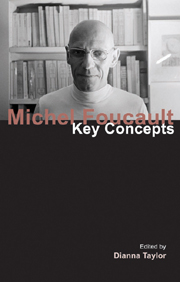3 - Biopower
from PART I - POWER
Summary
French philosopher Michel Foucault is perhaps best known as a theorist of power. Foucault analysed several different types of power, including sovereign power, disciplinary power and the subject of the current chapter: biopower. In what follows, I will first provide an overview of biopower as Foucault conceives of it. This overview will distinguish biopower from sovereign and disciplinary power, identify and discuss distinctive characteristics of biopower and provide examples which illustrate these characteristics. The final section of the chapter undertakes an extended example of a particular occurrence of biopower within modern and contemporary Western societies.
Powers of life and death: from sovereign power to biopower
In The History of Sexuality: An Introduction (1990a) and in his 1975–76 Collège de France course, Society Must Be Defended (2003) Foucault describes biopower as a power which takes hold of human life. In both these works Foucault traces the shift from classical, juridicolegal or sovereign power to two typically modern forms of power, discipline and biopower, as a shift from a right of death to a power over life: “in the classical theory of sovereignty, the right of life and death was one of sovereignty's basic attributes … The right of sovereignty was the right to take life or let live. And then this new right is established: the right to make live and to let die” (2003: 240–41). Sovereign power is a power which deduces.
- Type
- Chapter
- Information
- Michel FoucaultKey Concepts, pp. 41 - 54Publisher: Acumen PublishingPrint publication year: 2010
- 6
- Cited by

